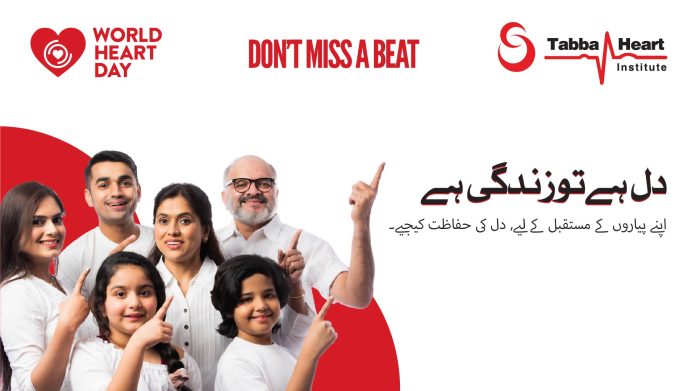Heart disease, once considered a condition impacting mostly middle-aged and older populations in Pakistan, is now striking alarmingly young individuals. Cardiologists across Karachi, Lahore, and other major cities are increasingly treating patients in their twenties and thirties for heart attacks, strokes, and heart failure. This troubling shift endangers Pakistan’s most productive generation.
In line with the World Heart Federation’s 2025 theme, “Don’t Miss a Beat,” Tabba Heart Institute (THI) has launched a nationwide call to action under the campaign “Dil Hai Toh Zindagi Hai.” The message is clear: early prevention, regular heart health screening, and lifestyle changes are the most effective ways to safeguard lives.
A Growing Youth Crisis
Recent research and Pakistan heart health statistics confirm that the country has one of the highest rates of heart disease in South Asia, with an alarming rise in youth heart disease in Pakistan. The convergence of sedentary lifestyles, fast-food culture, smoking, and high stress has created a public health emergency. Preventive check-ups and awareness, however, remain scarce.
“We’re treating patients today who, by all traditional measures, should have been decades away from heart disease,” said Dr. Bashir Hanif, Executive Director and Consultant Cardiologist at Tabba Heart Institute. “It’s heartbreaking because so much of it could have been prevented. Young people believe they’re invincible, but dil hai toh zindagi hai — you cannot build your future on an unhealthy heart.”
Tabba Heart Institute’s Preventive Campaign
To confront this crisis, Tabba Heart Institute has rolled out a month-long awareness campaign from September 26 to October 25, 2025. Going beyond its clinical operations, THI is extending outreach into public spaces — shopping malls, corporate offices, and even city buses.
Key activities include:
- Community Cycle Ride with Karachi’s cycling groups.
- Heart health screening camps at workplaces and public venues.
- Interactive awareness sessions in schools, universities, and offices.
- Radio and transit messages reaching citizens in their daily routines.
“We cannot only address those who are already sick. Preventive care must be appealing and accessible for the youth,” Dr. Hanif emphasized. “Cycling, walking, and balanced diets are not punishments but long-term investments in yourself.”
Screening as Empowerment
As part of the initiative, Special Heart Health Screening Packages with discounts of up to 35% are being offered at Tabba Heart Institute. These packages provide a complete cardiac risk profile — cholesterol levels, blood pressure, ECG, and more — enabling early detection and intervention.
“Knowing your numbers is not about fear; it is about empowerment,” explained Dr. Hanif. “Early screening gives individuals the opportunity to adjust their lifestyle and protect their future.”
Leadership Beyond Treatment
Long recognized as the best cardiac hospital in Pakistan, and a pioneer in interventional cardiology in Pakistan, Tabba Heart Institute continues to set standards of excellence by spearheading a nationwide cardiac health awareness campaign. Today, its leadership extends into preventive health, community education, and public engagement. By addressing risk factors early, THI aims to reduce the burden of cardiovascular disease on the nation.
A Call to Action
On this World Heart Day 2025, Tabba Heart Institute urges Pakistan’s youth to take charge of their health. Participate in awareness events, join the community cycle ride, encourage workplaces to host screening camps, and engage in conversations about preventing heart disease in Pakistan.
“Heart disease is not destiny,” Dr. Hanif concluded. “With the right knowledge and small daily actions, it can be prevented. Protecting our young hearts means protecting Pakistan’s future. Don’t Miss a Beat — Dil Hai Toh Zindagi Hai.”
Visit https://tabbaheart.org/screening-packages/ for more details.


